May 21, 2025 | 03:01 GMT +7
May 21, 2025 | 03:01 GMT +7
Hotline: 0913.378.918
May 21, 2025 | 03:01 GMT +7
Hotline: 0913.378.918
Within the framework of the seminar "Circular Agriculture - Green Farms - Clean Products," a large number of leading experts, scientists, businesses, and farmers were gathered to discuss circular agriculture models and share practical experiences in building green farms and producing clean products.
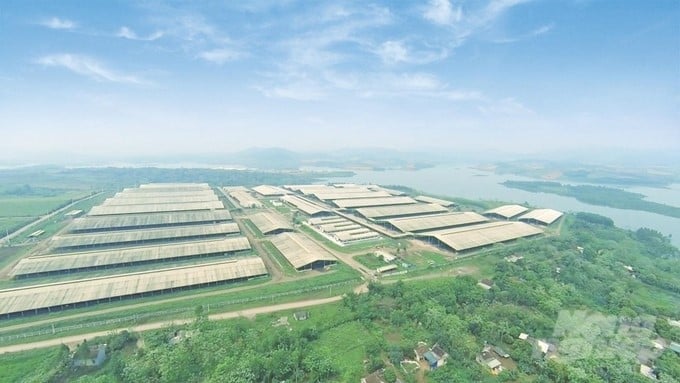
Building green farms and producing clean products is of concern to the entire society. Photo: MS.
According to the Vietnam Council of Agricultural Companies (VCAC), circular agriculture is an advanced agricultural production model that imitates natural ecosystems where resources are used effectively and maximally, reducing waste and greenhouse gas emissions. This model is increasingly being concerned with and applied in Vietnam, promising to bring many benefits to the environment, society, and economy.
Mr. Ha Van Thang, Chairman of VCAC, shared: "Circular agriculture is an inevitable trend and plays an extremely important role. We appreciate green and clean products that not only bring health to domestic consumers but are also aimed at export."
According to Mr. Thang, green agriculture is aiming to improve the competitiveness of agricultural products and develop technology to process and reuse by-products and waste, not only improving value but also improving the environment, helping farmers have a better quality of life, and protecting resources and agricultural ecosystems. Thereby ensuring sustainable agriculture and contributing to green economic development.
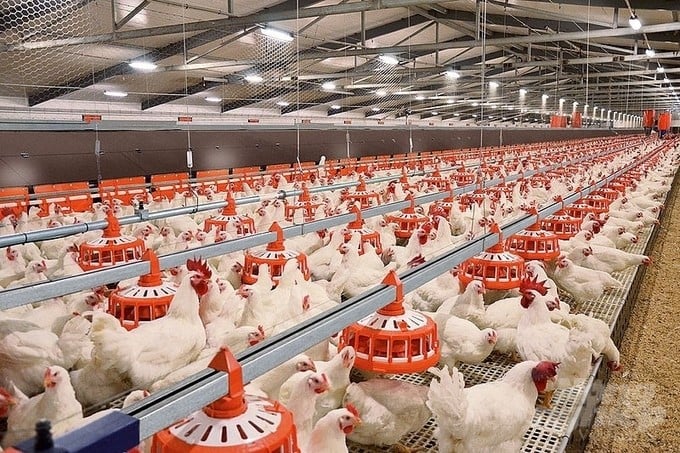
Experts said that the issue of "animal welfare, sustainable livestock farming development, and export" needs to be associated with biosafety and reducing antibiotics in livestock farming as solutions for livestock products to qualify for export to many markets. Photo: MS.
At the seminar, experts also discussed the issue of "animal welfare, sustainable livestock farming development, and export."
According to the Vietnam Farms and Agricultural Enterprises Association (VFAEA), animal welfare is simply understood as treating animals well so that they are in the best physical and mental state, avoiding unnecessary pain.
Consumers are also paying great attention to the food from livestock and how they live in barn conditions. This is also a future trend that consumers are very interested in and aim for transparency.
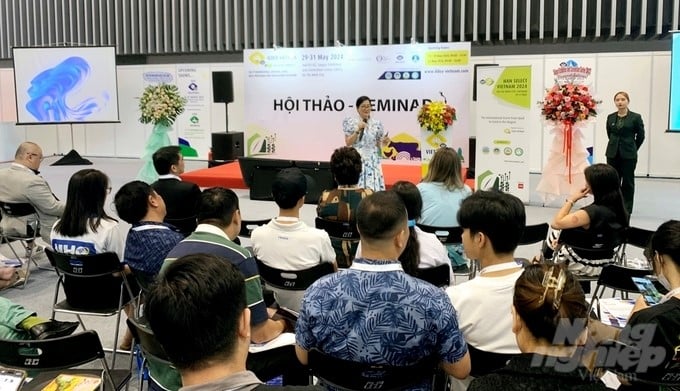
According to Dr. Ha Thuy Hanh, consumers are also paying great attention to the food from livestock and how they live in barn conditions. Photo: Minh Sang.
Dr. Ha Thuy Hanh, Vice President of VFAEA, affirmed: "In Vietnam, animal welfare is still a new concept, and not all farmers understand it. However, animal welfare is an extremely important factor in developing a sustainable livestock industry."
To keep products from cattle and poultry free of antibiotic residues and growth substances, livestock (hens and sows) should be freed from cages to live in a free environment according to their behavior. When livestock are not stressed, they will produce more productive and better-quality meat and eggs.
The entire country currently has a total chicken flock of about 550 million heads, but the proportion of chicken farming that ensures animal welfare is still very small. Dr. Hanh cited real evidence that in Vietnam, chickens are often kept in cages with many floors. Meanwhile, egg-laying chickens are often kept in cages at high density without laying nests, lack exercise and playgrounds, are not allowed to express instinctive animal behavior, and lack perches, sand digging, etc. But, these are the standards that help the chicken express its most natural instincts and keep it healthy.
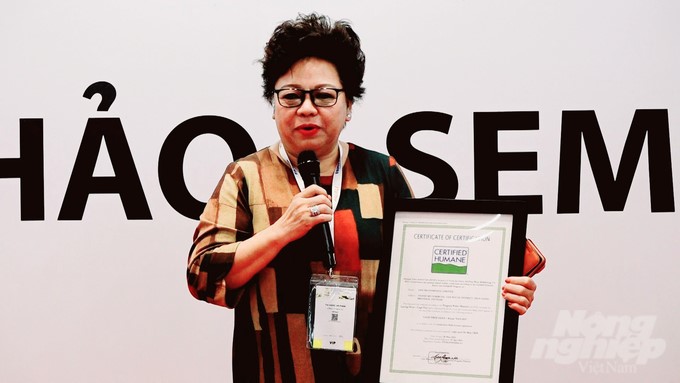
Ms. Pham Thi Ngoc Ha, General Director of San Ha Co., Ltd., excitedly shared at the seminar about San Ha's journey in accompanying the agricultural sector with the wish to have quality products to serve consumers. Photo: Minh Sang.
Similarly, with industrial pregnant and nursing sows raised in metal cages, they lack movement and conditions to express natural instincts such as rubbing their snouts, moving, standing, interacting, etc.
The entire country now has about 3.2 million sows used to provide breeds for Vietnam's pork industry. The rate of cage farming is still common, and there are currently no pig farms certified for animal welfare.
Animal welfare, in addition to biosafety, also brings product value and brand value to businesses. San Ha is a pioneering business in the field of food production in Vietnam, actively promoting the application of circular agriculture models and improving animal welfare in Vietnam.
Ms. Pham Thi Ngoc Ha, General Director of San Ha Co., Ltd., excitedly shared: "We have just been awarded a farm animal welfare certificate, Humane Farm Animal Care (HFAC). However, I think this is just the beginning of our business's long journey for the circular agriculture sector, green farms, and clean products in the coming time."
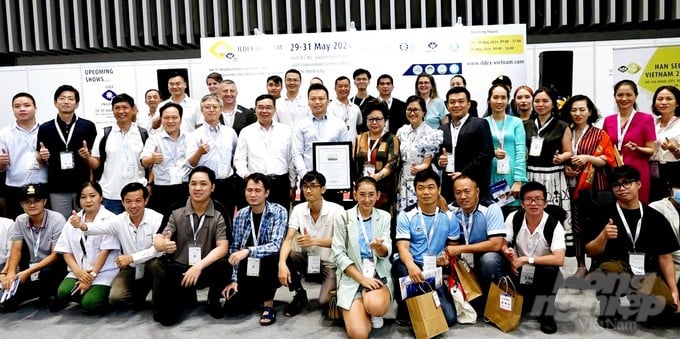
Domestic and international business delegates congratulated San Ha Company on being awarded the farm animal welfare certificate, Humane Farm Animal Care (HFAC), and took souvenir photos at the seminar. Photo: Minh Sang.
According to Ms. Ha, Vietnamese agricultural businesses need to improve product quality, aiming for clean, safe, and valuable products to supply to the market and bring health to Vietnamese consumers.
"VFAEA has cooperated with Humane Society International (HSI), the world's leading animal protection organization, and San Ha Company, a pioneering business in the field of food production in Vietnam, to promote sustainable and ethical agricultural practices in Vietnam by combining the expertise and resources of three organizations. This cooperation wishes to bring the necessary knowledge and connections to implement circular agriculture models, improve animal welfare, and create a safer and more sustainable food supply for consumers," said Dr. Ha Thuy Hanh.
Translated by Thu Huyen

(VAN) Japan's grant aid project contributes to capacity building, promoting organic agricultural production, and fostering sustainable community development in Dong Thap province.

(VAN) For years, the CRISPR-Cas9 genome technology has been reshaping genetic engineering, a precision tool to transform everything from agriculture to medicine.

(VAN) Vietnam aims to become a 'leader' in the region in the capacity and managing effectively soil health and crop nutrition.
![Reducing emissions from rice fields: [Part 1] Farming clean rice together](https://t.ex-cdn.com/nongnghiepmoitruong.vn/608w/files/news/2025/05/05/z6509661417740_a647202949c539012a959e841c03e1d3-nongnghiep-143611.jpg)
(VAN) Growing clean rice helps reduce environmental pollution while increasing income, allowing farmers to feel secure in production and remain committed to their fields for the long term.
/2025/05/19/5136-1-144800_230.jpg)
(VAN) The Nghe An Provincial People's Committee has just approved the list of beneficiaries eligible for revenue from the Emission Reductions Payment Agreement (ERPA) in the North Central region for the year 2025.

(VAN) 14 out of 35 domesticated elephants in Dak Lak province have had their living conditions improved, with 11 of them currently participating in the non-riding elephant tourism model.

(VAN) Muong Nhe Nature Reserve hopes that being upgraded to a national park will lay the foundation for forest protection efforts to be carried out in a systematic, modern, and sustainable manner.